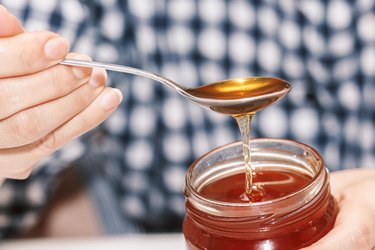
A spoonful of honey may be just what the doctor ordered when it comes to calming a cough. Plus, you'll get none of the side effects seen with some prescription and over-the-counter cough remedies.
Read on to learn how to use honey for cough relief, including the recommended dosage for adults and children.
Video of the Day
Video of the Day
Read more: 6 Surprising Benefits of Honey
Can Honey Stop a Cough?
This thick, golden liquid produced by bees is a tried-and-true home remedy for cough, says E. Neil Schachter, MD, pulmonologist and medical director for the Respiratory Care Department, Mount Sinai Hospital, and Maurice Hexter Professor of Pulmonary, Critical Care and Sleep Medicine at Mount Sinai School of Medicine in New York City.
"Since ancient times, honey has been used for wound healing and for upper respiratory symptoms, principally cough," says Dr. Schachter, also the author of several books, including The Good Doctor's Guide to Cold and Flu.
Honey has anti-inflammatory as well as anti-bacterial properties, which can quell cough.
"Honey also can coat an irritated, inflamed throat, reducing the cough reflex and preventing irritating substances inhaled or eaten from further irritating the upper respiratory passages," Dr. Schachter says. It's also safe and relatively inexpensive, he adds.
A robust body of research in people with cough backs up this advice. In an August 2020 review in BMJ Evidence-Based Medicine that looked at 14 studies on the use of honey to treat upper respiratory tract infections in adults and kids, those who were given honey had less severe and less frequent coughing bouts than those who received usual care such as over-the-counter cough syrups, cold and allergy medicines and painkillers.
"Unlike the medical remedies, honey is essentially without side effects. It also has the advantage of reducing cough without the use of inappropriate antibiotics," Dr. Schachter says.
Overuse of antibiotics has led to the development of antibiotic resistance and superbugs, he says. Most of the time coughs are caused by a viral upper respiratory tract infection, not a bacterial one, so antibiotics wouldn't help anyway, though many people ask their doctors for them.
How to Use Honey as a Cough Suppressant
There are lots of different types of honey available, and many over-the-counter or natural cough suppressants actually contain honey, but Dr. Schachter is a fan of traditional processed honey for cough.
"Raw honey may have higher levels of pollen that can trigger allergic responses in sensitive individuals," he says.
Suggested Dosage
Dr. Schachter recommends taking the following dosage of honey twice a day:
- Children ages 1 to 5: 1/2 teaspoon
- Children ages 6 to 11: 1 teaspoon
- Children ages 12 to 18: 2 teaspoons
- Adults: 2 teaspoons
Children younger than 12 months should not be given honey because of the potential risk of botulism poisoning, Dr. Schachter says. But for young ones over a year old, honey is a viable option, especially because the U.S. Food & Drug Administration doesn't recommend over-the-counter medicines for cough and cold symptoms in children younger than 4 due to risk of serious side effects.
Adding honey to a hot, decaffeinated drink with lemon and ginger before bed makes sense, especially for kids, Dr. Schachter says. "Such a preparation given before bedtime can be as or more beneficial than standard medication cough suppressants such as [the cough syrup ingredient] dextromethorphan in kids," he says.
Honey may even help kids with cough (and their parents) get a better night's sleep, according to research in the September 2012 issue of Pediatrics. Children who received honey coughed less frequently, less severely and slept better than kids who didn't get honey. Parents of children who were given honey also slept better.
When to See a Doctor About a Cough
Keep in mind that some coughs may be the symptoms of a more serious illness such as pneumonia, Dr. Schachter says.
"It is important to identify these early to initiate appropriate treatment, in addition to providing symptom relief," he says.
See a doctor if your cough lasts longer than three weeks, doesn't get better with natural remedies (like using a humidifier) or is accompanied by fever and/or shortness of breath, Dr. Schachter says.
- E. Neil Schachter, MD, pulmonologist, medical director, Respiratory Care Department, Mount Sinai Hospital; Maurice Hexter Professor of Pulmonary, Critical Care and Sleep Medicine, Mount Sinai School of Medicine, New York, New York
- BMJ Evidence-Based Medicine: “Effectiveness of Honey for Symptomatic Relief in Upper Respiratory Tract Infections: A Systematic Review and Meta-Analysis”
- U.S. Food & Drug Administration: “Use Caution When Giving Cough and Cold Products to Kids”
- Pediatrics: “Effect of Honey on Nocturnal Cough and Sleep Quality: A Double-Blind, Randomized, Placebo-Controlled Study”
Was this article helpful?
150 Characters Max
0/150
Thank you for sharing!
Thank you for your feedback!
Is this an emergency? If you are experiencing serious medical symptoms, please see the National Library of Medicine’s list of signs you need emergency medical attention or call 911.